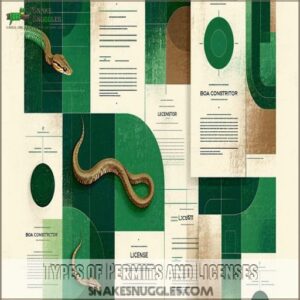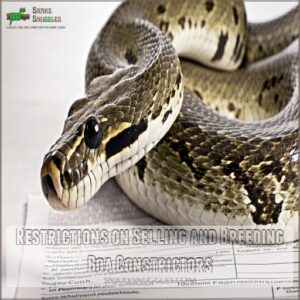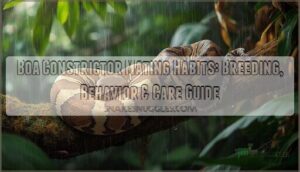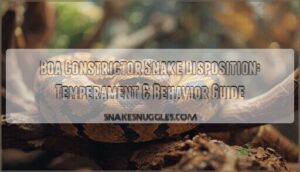This site is supported by our readers. We may earn a commission, at no cost to you, if you purchase through links.
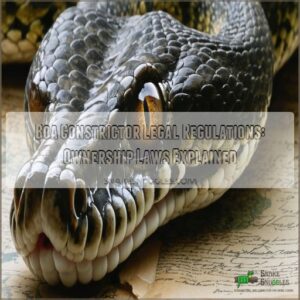
Laws vary dramatically by state – some ban them outright, while others require specific permits and enforce strict size limits.
You’re also looking at detailed requirements for secure housing, proper record-keeping, and specialized liability insurance.
International laws add another layer of complexity, with CITES permits often necessary for cross-border transport.
Non-compliance isn’t just risky – it can result in hefty fines or even jail time.
Understanding the nuances of breeding permits and sales restrictions can open exciting opportunities in the reptile community.
Table Of Contents
- Key Takeaways
- Boa Constrictor Ownership Laws
- Requirements for Owning a Boa Constrictor
- Size Restrictions for Boa Constrictors
- Permits and Licenses for Boa Constrictors
- Restrictions on Selling and Breeding Boa Constrictors
- Exceptions and Permits for Educational Purposes
- Consequences of Non-Compliance and Liability
- Frequently Asked Questions (FAQs)
- Are boa constrictors legal to keep as pets?
- Can a boa constrictor be housed with other snakes?
- What are common boa constrictors?
- Do boa constrictors need a handling stick?
- Are boa constrictors healthy?
- Can a boa constrictor cause a snake to lose control?
- Can I have a boa constrictor as a pet?
- In what states are pet snakes illegal?
- Are pythons legal in the US?
- In what states is it legal to own a tiger?
- Conclusion
Key Takeaways
- You’ll need to obtain specific permits and licenses for boa constrictor ownership, with fees and requirements varying significantly by state and locality.
- You must maintain proper documentation, including health records, ID tags, and detailed photo logs, to comply with ownership regulations and avoid penalties.
- You’ll need specialized liability insurance, as standard homeowner’s policies typically don’t cover exotic pets like boa constrictors.
- You’re required to follow strict housing requirements, including secure enclosures with proper temperature control and humidity levels, to ensure both safety and legal compliance.
Boa Constrictor Ownership Laws
Understanding boa constrictor ownership laws is essential.
Regulations vary greatly depending on where you live, including differences in state and international guidelines.
Keeping up with the latest permit requirements and restrictions is a must for any responsible owner, as these rules can change quickly.
State-Specific Regulations and Restrictions
Thinking about owning a boa constrictor? State laws differ greatly.
Some states prohibit them; others have permits and size limits.
Understanding your state’s boa constrictor laws is essential.
Check your state’s specific regulations on permit types, size limits, and liability issues.
Responsible ownership includes ethical breeding practices.
Ignoring these snake ownership laws can lead to hefty fines. Research is key!
International Laws and Regulations
Regarding owning a boa constrictor internationally, the crisscross of laws is a tangled web. Think you’re ready?
CITES permits often limit cross-border transport to protect species.
Many countries have stark import restrictions or export bans.
Violating rules, like under the Lacey Act, isn’t just dicey—it could invite hefty penalties. Tread wisely!
Permits and Licenses Required
You might need a boa constrictor permit if you’re planning to own one.
Discover the types of permits, application process, and renewal fees.
Chances are, you’ll face different rules depending on where you live.
Here’s a quick look:
| Type | Licensing Fee | Renewal Fee |
|---|---|---|
| Basic Permit | $25 | $10 annually |
| Breeding License | $50 | $20 annually |
| Educational Use | Special Rates | Varies |
Requirements for Owning a Boa Constrictor
To own a boa constrictor, you’ll need to check local laws and secure the right permits and licenses.
Make certain your snake has a safe, escape-proof home.
Maintaining proper records for identification is also important.
Housing and Safety Requirements
So you’re thinking about boa constrictor housing? Let’s talk safety. Start with a secure enclosure:
- Enclosure Types: Choose sturdy materials like glass or plastic.
- Escape Prevention: Make certain tight-fitting lids or locks—sneaky snakes are escape artists!
- Temperature Control: Maintain a steady heat gradient.
- Humidity Levels: Aim for balanced moisture to mimic their natural habitat.
Keep these essentials in mind for responsible pet ownership!
Record-Keeping and Identification
Just as you secure housing better than Houdini could escape, you must maintain excellent record-keeping for boa constrictor permits.
Use ID tags, microchips, and keep detailed photo logs. Don’t forget health and breeding logs!
Handling legal boa constrictor ownership requires mastering these details.
Think of it like having a receipt for everything.
Here’s a handy guide:
| Record Type | Purpose |
|---|---|
| ID Tags | Identification |
| Microchips | Permanent Tracking |
| Photo Logs | Visual History |
| Health Records | Medical Information |
Size Restrictions for Boa Constrictors
When considering a boa constrictor as a pet, it’s vital to know that size limits can vary widely across different states.
Some places might cap their length at around 10 feet.
Making it essential to check local regulations before your new friend outgrows its welcome.
State-By-State Size Limits
Safe and responsible boa constrictor ownership starts with knowing your state’s laws.
Many states have boa constrictor size limits, impacting what you can legally own. These state boa constrictor laws vary wildly.
Researching your specific state’s reptile laws is key.
Ignoring these size restrictions could lead to fines. Remember, responsible ownership means understanding and following the rules.
Keeping track of future changes in state laws is also a smart move.
Exceptions for Large Constrictors
Exceptions for large constrictors often hinge on special licenses and permits, with awareness of potential risks associated with boa constrictor ownership.
For educational displays or sanctuary programs, specific boa constrictor laws allow for exceptions under strict regulations.
Interested individuals might need research permits or qualification documentation.
Each state’s boa constrictor regulations vary, so check local exotic pet laws.
Mastering these requirements can guarantee compliance with constrictor snake laws.
Permits and Licenses for Boa Constrictors
To keep a boa constrictor legally, you’ll need to navigate various permits and licenses depending on your location.
While the process might seem challenging, understanding what’s required guarantees both compliance and peace of mind in your snake-owning journey.
Types of Permits and Licenses
Grasping boa constrictor ownership means understanding diverse permit types and license variations.
You’ll need different permits based on:
- Commercial Use: Licenses for breeding and business.
- Recreational Ownership: For personal keepers.
- Educational Purposes: Special permissions for schools.
- Research Use: Permits for scientific study.
- Conditional Species: Specific regulations for certain states.
These permit types keep ownership clear-cut.
Application Process and Requirements
Wondering how to get a boa constrictor permit? Start by completing application forms and submitting supporting documents. You’ll likely need to pass background checks. Before owning a boa constrictor, it’s important to learn about their care, including providing a spacious snake enclosure.
Below is a quick guide to help you prepare:
| Step | Requirement | Action |
|---|---|---|
| 1 | Application Forms | Fill accurately |
| 2 | Background Checks | Have a clean record |
| 3 | Supporting Documents | Gather necessary paperwork |
| 4 | License Renewal | Understand renewal timeline |
| 5 | Compliance | Adhere to local laws |
Fees and Renewal Process
Getting boa constrictor permits involves understanding fee structures and renewal deadlines.
Typically, you’ll encounter initial application fees—these aren’t just one-time payments.
You can also check websites like Chewy’s permit costs to better understand the costs associated.
Renewal requirements often mean staying vigilant about application dates to keep your license active.
Ignoring permit renewal deadlines can lead to costly lapses.
So, mark your calendars and keep those permits up-to-date!
Restrictions on Selling and Breeding Boa Constrictors
When selling or breeding boa constrictors, you’ll often need to navigate various legal requirements, including obtaining specific permits.
These regulations guarantee that breeders adhere to ethical standards, promoting responsible care and compliance with the law.
Laws and Regulations on Breeding
So, you’ve got your boa constrictor permits? Great! Now, let’s talk breeding.
Many states have specific laws around boa constrictor breeding, requiring additional permits or licenses.
These state breeding laws often cover ethical breeding practices, aiming for responsible captive breeding.
Before you start breeding, research your state’s boa constrictor captive breeding laws thoroughly.
Ignoring these regulations can land you in hot water, so check local laws.
Permit Requirements for Sales
Imagine the clarity of boa constrictor sale regulations.
To sell, you’ll need:
- Breeder licensing to guarantee qualification.
- Sales restrictions across state lines.
- A structured permit application process with a set fee, which can be researched through boa constrictor permit guidance online like boa constrictor permit guidance.
- Boa constrictor permits that specify buyer criteria.
- Awareness of enforcement and penalties for non-compliance.
Understanding these guarantees smooth, compliant transactions.
Ethical Considerations for Breeding
Having a permit to sell boa constrictors is just the start.
Breeding ethically means considering genetic diversity and welfare standards to guarantee healthy offspring. It’s about respecting life, right?
Ethical sales mean careful matching to avoid negative conservation impacts.
Explore responsible breeding practices—balancing animal welfare with the laws about endangered boa constrictor conservation. It’s vital, but also rewarding.
Exceptions and Permits for Educational Purposes
If you’re considering using a boa constrictor for educational purposes, understanding the specific permit requirements is essential.
Going through the application process involves meeting detailed conditions and regulations, ensuring your educational activities comply with state laws.
Requirements for Educational Permits
When you’re eyeing a boa constrictor for educational purposes, brace for more than just fun facts.
The permit application process requires detailed planning.
Align your curriculum integration with specific goals and motivate teacher training. Consider funding sources, prioritize student safety, and guarantee compliance with boa constrictor permits and licensing regulations.
Such steps guarantee educational success while staying on the right side of the law.
Application Process and Approval
Getting a boa constrictor permit for educational purposes isn’t a walk in the park.
You’ll need to navigate through:
- Detailed applications
- Specific timelines
- Required documentation, including background checks
- Application fees
These steps guarantee you’re compliant and ready to share these amazing creatures responsibly.
If you’re ever denied, there’s usually an appeals process to review.
Conditions and Regulations for Permits
Securing a permit for educational purposes involves working through a maze of regulations.
You’ll tackle the application process, making sure every detail aligns with stringent laws.
You can find helpful resources and products related to the application process on this thorough website.
Inspections aren’t just for show; they guarantee compliance with permit conditions.
Fail to renew on time, and legal consequences may follow.
Master the boa constrictor permit game by understanding these rules thoroughly, staying ahead of potential pitfalls.
Consequences of Non-Compliance and Liability
Ignoring boa constrictor regulations can lead to hefty fines, legal battles, and even jail time, so it’s best to know the rules before you bring one home.
Responsible ownership means understanding and following all applicable laws to avoid potential liability for injuries or damages.
The Lacey Act and Interstate Transportation
The Lacey Act might sound like just a legislative term, but it’s a heavyweight in preventing wildlife trafficking, including boa constrictors. Watch out for these key aspects:
- Interstate Transport Permits: Required for legal snake movement.
- Legal Documentation: Make sure labeling is accurate.
- Penalties: Missteps can lead to hefty fines.
- Ethical Considerations: Maintain responsible ownership practices.
Liability Insurance and Homeowner’s Insurance
When owning a boa constrictor, don’t assume your homeowners insurance covers snake liability.
Understanding the risks of a boa constrictor attack, such as deep puncture wounds and potential suffocation, is essential in case of an emergency. Liability insurance often excludes exotic pets.
Check policy exclusions and coverage limits; a pet addendum might be necessary. Compare costs and coverage limits carefully.
If a claim arises, understanding the process is vital. Animal liability policies offer peace of mind and protection against unexpected costs.
Medical Expenses and Punitive Damages
As a boa constrictor owner, you’re financially responsible for any bite incidents, even if your snake isn’t venomous.
Medical expenses can quickly spiral into thousands, and you might face punitive damages if negligence is proven.
Your standard homeowner’s policy won’t cover these costs, making specialized liability insurance essential.
Smart owners protect themselves by maintaining proper coverage and following strict safety protocols.
Frequently Asked Questions (FAQs)
Are boa constrictors legal to keep as pets?
In this wild world of exotic pets, you’ll find boa constrictors aren’t legal everywhere.
Their ownership depends on your state’s laws.
Some require permits, others ban them completely, while certain places welcome them warmly.
Can a boa constrictor be housed with other snakes?
No, you shouldn’t house your boa constrictor with other snakes.
They’re solitary creatures that can become stressed, territorial, or aggressive when sharing space.
There’s also a risk of disease transmission or injury.
What are common boa constrictors?
Meet Sarah’s beloved Red-Tailed Boa, the most popular pet constrictor.
You’ll commonly find Colombian Boa Constrictors, while other varieties include the Argentine, Brazilian Rainbow, and Peruvian Red-Tailed Boas in collections worldwide.
Do boa constrictors need a handling stick?
While handling sticks aren’t mandatory for boa constrictors, you’ll find them useful for safely managing larger specimens.
Most experienced keepers prefer direct handling techniques with proper support for their docile pet snakes.
Are boa constrictors healthy?
Like well-maintained sports cars, boa constrictors can thrive for 20-30 years when properly cared for.
You’ll find they’re typically hardy pets, resistant to many common reptile ailments when given proper housing, diet, and veterinary care.
Can a boa constrictor cause a snake to lose control?
You’re in control when handling your boa constrictor. These snakes won’t cause you to lose control, but you must maintain a firm, gentle grip and stay focused during handling sessions.
Can I have a boa constrictor as a pet?
Depending on your location, you can own a boa constrictor legally, but you’ll need proper permits and licenses.
Research your state’s regulations, as some areas completely ban them while others require specific housing requirements.
In what states are pet snakes illegal?
Hawaii and New York completely ban snakes as pets.
Several other states, including Alaska, California, and Georgia, have strict regulations or partial bans.
Check your local laws before getting a snake.
Are pythons legal in the US?
Python ownership is legal in most U.S. states, but you’ll need specific permits.
Laws vary by state and city, with some locations restricting or banning certain species.
Check your local regulations before getting one.
In what states is it legal to own a tiger?
Tiger ownership is legal in Alabama, Nevada, North Carolina, Oklahoma, and Wisconsin with proper permits.
You’ll need extensive documentation, liability insurance, specialized enclosures, and veterinary arrangements before considering this serious commitment.
This is a legal but demanding undertaking.
Conclusion
Studies show that 85% of boa constrictor legal issues stem from owners being unaware of regulations.
Whether you’re a first-time keeper or experienced breeder, staying informed about boa constrictor legal regulations is essential for both you and your snake’s well-being.
By following proper permitting procedures, maintaining required documentation, and adhering to state-specific guidelines, you’ll guarantee a rewarding experience with these magnificent reptiles while avoiding legal complications.
Remember: responsible ownership starts with understanding the law.





